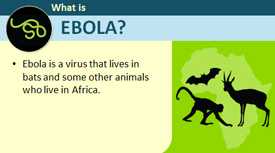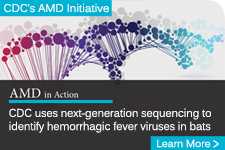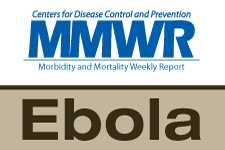Resources for Parents, Schools, and Pediatric Healthcare Professionals
 We learn more about Ebola every day. Children can get Ebola, just like adults. In past outbreaks, case fatality rates for children were high, just like adults. However, fewer children were identified with Ebola than adults. This is likely because children are often separated from sick people and don’t serve as caregivers or participate in funeral rituals, which are high risk activities.
We learn more about Ebola every day. Children can get Ebola, just like adults. In past outbreaks, case fatality rates for children were high, just like adults. However, fewer children were identified with Ebola than adults. This is likely because children are often separated from sick people and don’t serve as caregivers or participate in funeral rituals, which are high risk activities.
Children have unique physical, developmental, and social needs. It is also important to recognize their special mental health needs, because information about Ebola can be scary. Children may need help understanding what they hear about Ebola on the news or from their friends.
Information for Parents and Families
CDC, along with state and local public health departments, continues to take steps to help keep the risk low for everyone, including children. The following information can help parents, school administrators, and healthcare workers learn more about the physical and mental health needs of children during an Ebola outbreak. Below are a few resources to help parents learn more about Ebola so they can decide what information to share with children.
Information for Schools and Child Care Centers
Although Ebola is a very rare disease in the United States, CDC has developed guidance to address concerns and recommend actions K-12 schools can take to prevent transmission of Ebola, if needed. School officials should consult with appropriate state and local health officials on Ebola-related decisions.
Tools for K-12 Schools:
- Archived: Addressing Ebola Virus Infection Concerns in K-12 Schools: Interim Guidance for District and School Administrators Tools for K-12 School Districts
- The Department of Education has tools to help schools implement this guidance
Tools for Head Start, Early Head Start, and Child Care Providers:
- Administration for Children and Families has materials to assist those who care for children 0-5
Information for Pediatric Healthcare Providers
We are working to learn more about the impact of Ebola on pediatric patients. The following publications may be helpful:
- Ebola Virus Disease and Children: What US Pediatricians Need to Know
- Ebola Virus Disease: Focus on Children
- What Obstetrician–Gynecologists Should Know About Ebola
- The American Academy of Pediatrics early release Red Book chapter on Ebola [PDF – 5 pages]
- Management of pregnant women infected with Ebola virus in a treatment centre in Guinea, June 2014
- Q&A’s about the Transport of Pediatric Patients (
- Care of a Neonate Born to a Mother who is Confirmed to have Ebola, is a Person under Investigation, or has been Exposed to Ebola
Preparing, Just in Case
Thankfully, the chances of having a patient in your care with Ebola are very low. However, it is always helpful to prepare yourself and your practice by having procedures in place to respond to concerns, provide appropriate care to patients, and protect yourself and staff. Here are some resources:
Information for Non-U.S. Audiences
Just for Kids
 Check out this slide set explaining Ebola [PPT – 32 pages] – designed especially for middle school students!
Check out this slide set explaining Ebola [PPT – 32 pages] – designed especially for middle school students!
- Page last reviewed: February 18, 2016
- Page last updated: February 18, 2016
- Content source:




 ShareCompartir
ShareCompartir